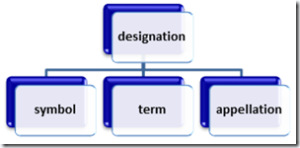Indeed. Except if it has been “determinologized.” If terminologization is when a common everyday word turns into a technical term, then the reverse process is when a technical term from a technical subject field becomes part of our everyday vernacular. The process was identified, analyzed and, I believe, named by Ingrid Meyer and Kristen Mackintosh in a paper in Terminology in 2000.
They describe two categories of determinologization.
1. The term retains essentially the same meaning, but is no longer used by subject matter experts referring to a concept in their field. Rather the subject matter might have become popularized, and laypersons understand enough about the concept to use the term. The term in the layman’s use refers to a “more shallow” meaning of the concept or one that also has other connotations.
Good examples are medical terms of diseases that are prevalent enough for all of us to have an idea about them. Insomnia, for instance, is a condition that for medical professionals is highly complex.
They might break it down into sleep maintenance insomnia, sleep-onset insomnia, etc. and treated it with benzodiazepines. It might be chronic or intermittent, familial or even fatal.
At some point, we all might have talked about it in a less medical sense. Here is the entry in the Urban Dictionary—a listing on this website is a good indication that a term has become a word in common usage. And to the right is an excerpt from the South African Mail&Guardian about a chess player who can’t sleep before competitions.
In these examples, the meaning behind the word “insomnia” remains the same as in the medical context: Someone can’t sleep. But our associations don’t take us to the clinical setting, rather we get a sense of the mood of the sufferer or the chosen cure.
2. The word now describes a completely different concept. While it shares some characteristics with the meaning in the technical subject of the term, it does no longer share the essential characteristics.
The Monday-morning quarterback is not a John Elway or Peyton Manning rising on the first workday of the week. It is the guy who watched them the day before and now tells his buddies how the quarterback could have done a better job or how anyone could have done a better job in any subject matter. The essence of the concept in sports, i.e. an American football player, is completely gone in this general use of “quarterback.”
A term from another sport, baseball, which has been determinologized, is home run. The excerpt from the Wall Street Journal shows that when someone hits a home run, there is no batter involved, not even a hit in the sport’s sense. But it is “a success.”
Enough baseball terminology has made it into the American vernacular that Dr. Jerry Roth at Sprachen- und Dolmetscher Institut in Munich gave it a special focus during our studies. He even had us meet in Englischer Garten for a game.
Why do we care? Well, if we create new terms, borrow them from other fields or languages, terminologize or determinologize them, the receiver of our message—and that does include translators in many cases—only understands it if our usage has the appropriate level of precision. Understanding the methods that we have to our avail allows us to choose the best methods. The likelihood that others will understand our message then is much higher. And after all, understanding is what communication is about.







 Terms represent generic concepts. They are the parent concept or superordinate to other concepts. The concept called “operating system” in English has many different subordinate concepts, e.g. Windows, Linux, or Mac OS. Many times generic concepts have native-language equivalents in other languages. Of course, a particular language may borrow a term from another language, a direct loan. But that should be a deliberate term formation method and it is just one of them, as discussed in
Terms represent generic concepts. They are the parent concept or superordinate to other concepts. The concept called “operating system” in English has many different subordinate concepts, e.g. Windows, Linux, or Mac OS. Many times generic concepts have native-language equivalents in other languages. Of course, a particular language may borrow a term from another language, a direct loan. But that should be a deliberate term formation method and it is just one of them, as discussed in  Once again, I find ISO 704 very helpful: “Technically, appellations are not translated but remain in their original language. However, an individual concept may have an appellation in different languages.” Good examples are international organizations which tend to have appellations in all languages of the member states, such as the European Union, die Europäische Union, or l’Union européenne.
Once again, I find ISO 704 very helpful: “Technically, appellations are not translated but remain in their original language. However, an individual concept may have an appellation in different languages.” Good examples are international organizations which tend to have appellations in all languages of the member states, such as the European Union, die Europäische Union, or l’Union européenne. There are actually two concepts hidden behind this name:
There are actually two concepts hidden behind this name: